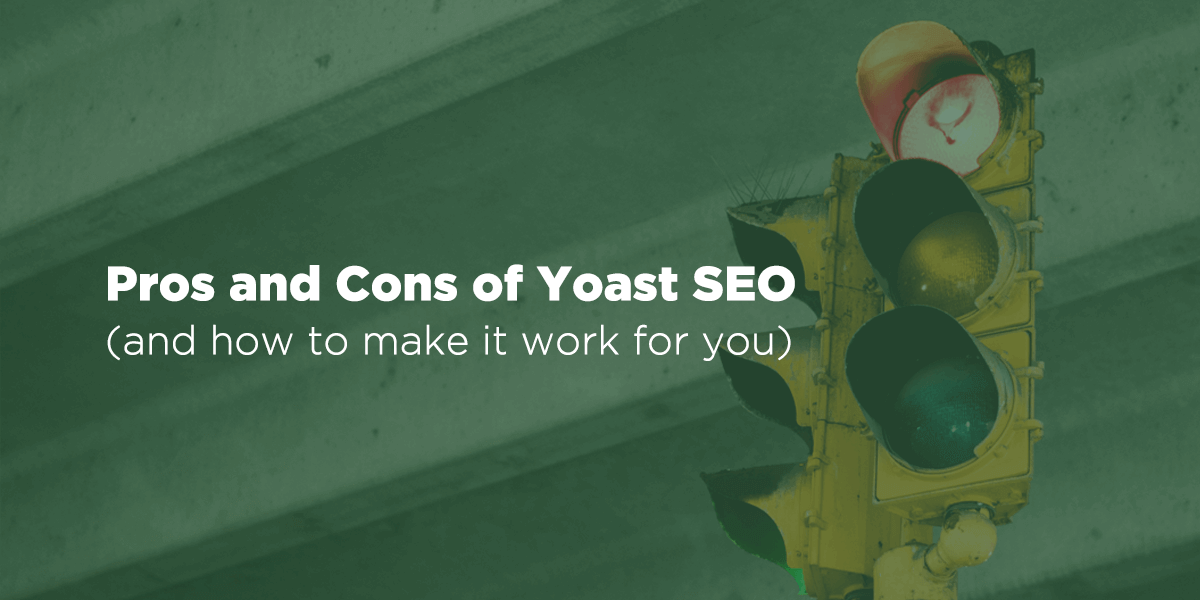
Yoast SEO is a great tool. If you know how to use it.
Every content writer in the WordPress community knows Yoast and is probably well-familiar with their on-page optimization SEO tool. Most of us have been supremely grateful for it at some point in our careers. It’s a popular tool, and for good reason: among the SEO plugins available on WordPress, it’s probably the most accessible and user-friendly.
But that doesn’t mean it’s perfect. Like any tool, Yoast works best when you use it properly. Take its suggestions as the gospel truth, and you’re likely to run into trouble. Here’s some of its top advantages and disadvantages, as well as tips for working past its flaws.
Pro: Yoast is an excellent on-page SEO check list.
I’m leading with this because it is far and away Yoast’s greatest strength, and (to be fair) the feature they’re actually trying to market. Yoast SEO makes it easy to check your copy against a certain keyword to see how well you optimized for it. It’s a good reminder to include your keyword in your meta data, to check that your titles are descriptive, and that your chosen keyword appears in the copy enough times.
Con: Yoast is not good at understanding intent.
Every since Google’s Hummingbird update came out, “intent” has been a huge buzz word among SEOs. In many ways, it’s freeing: we no longer have to dogmatically adhere to an exact keyword phrase. Google can tell the difference between pronouns and how people use them. If you search for “recipe for peanut butter cookies” and “peanut butter cookie recipe,” you’ll get the same results.
Unfortunately, Yoast hasn’t caught up, and who could blame them: they’re not Google. Is anyone? But this can be misleading if you’ve written your copy with a few variations on the same keyword but are only getting scored on word-for-word matches on your focus keyword. If followed uncritically, this can cause some SEOs to change their wording to accommodate Yoast—to the detriment of natural-sounding English.
The fix: Trust your keyword research. If your terms are synonymous enough for Google, don’t start editing your copy to please Yoast.
Pro: Yoast is an SEO proofreader.
Did you accidentally begin three sentences with the same word? Did you misspell your focus keyword in your blog title? Have you already used that keyword on another blog post? These errors go beyond a simple checklist. They’re oversights that happen on a more human level: you could have read your blog title and missed the typo or failed to spot the awkward repetition in your prose. I’ve been there. I’ve done that.
The truth is, people are terrible at proofreading themselves. We become blind to our own writing. Our brains work against us, assuring us that we wrote what we intended. Yoast counteracts that to a comforting degree.
Con: Yoast is pedantic.
That said, Yoast falls prey to failings similar to those I sometimes encounter in grammar-correcting software. Yoast has a series of rules to follow, but it doesn’t know when or how to break them appropriately. Beginning three sentences in a row with the same word can be a stylistic decision intended to drive a point home. Repetition isn’t always awkward; sometimes it’s comforting.
I notice this the most when using their readability tool. I am a big proponent of readable copy, but unfortunately, sometimes your topic is too technical to achieve a perfect readability score. It’s irritating to one of those little orange or red lights pop up in your analysis section when there’s either nothing you can do about it. Even more so when Yoast is flat out wrong.
The fix: Trust your writing. None of your readers are going to see your SEO and readability scores. And in the end, while those scores can feel like a grade, it’s not a meaningful one. Assess what Yoast flags as possible problems or areas for improvement, and if the suggestions aren’t workable, move on.
Pro: Yoast can help you fix your flaws.
I’m sometimes surprised to notice a bad readability mark. By default, I expect my content to have a green readability score right from the start or with only a few improvements. But sometimes I write a post and it’s full of passive constructions and long sentences. I appreciate the way Yoast highlights these for me, because it makes it easier for me to review my writing rather than having to hunt through and count words in sentences on my own.
Similarly, I learned a lot in my early days of content writing by using Yoast’s suggestions as a springboard for learning more about SEO. If Yoast wanted me to do something and I didn’t understand why, that was a sign for me to go read up on the topic to understand more. And what I learned made me a better SEO.
Con: There’s more to SEO than Yoast.
At the same time, it’s easy when you’re just starting out to believe that Yoast is all there is to SEO. So long as you have that little green dot lights up next to your blog post, you’re good to go, right?
Wrong. Pursuit of that green light can be a misleading distraction from the purpose of your blog, and it can run contrary to good SEO practices. Yoast may want you to include your focus keyword in your alt attributes, but if you do that incorrectly you could get pinged for keyword stuffing. Similarly, you can’t just add links and expect it to do wonders to your on-page SEO. Unless those links are useful and relevant, you’re hurting your content.
The fix: Don’t rely on Yoast to do your SEO for you. Yoast does not do your marketing research, your keyword research, your link building, your technical optimizations, or any of your content strategy. If you don’t understand why Yoast wants you to do something, you’re just following blindly.
Yoast SEO is a guide, not a master.
I have personally found Yoast SEO very helpful over the years. Their blog also has some excellent resources, and I have referenced them at various times when trying to find information to support a certain course of action to clients. But Yoast SEO has its limitations, and it’s better to know and acknowledge them than to trust it blindly.
Yoast does not know the intent of your blog post. It does not know your writing style, your audience, your content strategy, or your subject matter. Yoast will tell you that you have done something wrong when you haven’t; it will also tell you you’ve done something right when you haven’t. Trust it too much, and you risk focusing more on those little green dots than on your audience.
We’ve talked before about SEO is a bit of a misnomer: you’re not optimizing for search engines; you’re optimizing for people. Similarly, you shouldn’t optimize your content for Yoast.
Focus on your readers. Write the best you can for them. Many of the things that make for good SEO will also make for reader-friendly content. Learn why, and follow those principles.
Then use Yoast as a check list before you publish.
